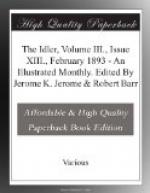“Well,” he replied, with a smile, “they are very kind. It is your professional critic who is severe, though I can honestly say they invariably treat me well. Criticism up to a certain point is good enough. Beyond that point it is absolutely disabling to me. My father was a very severe critic. When we went out together he used to take the first half-hour, and then go to the back of the hall and criticise me. But it so hampered me by causing me to think of and consider every pose that I had to beg of him to desist. And then again, as regards criticism, I always think—it may be very conceited on my part—that I know a great deal more what the public want than my critics do. I declare to you I should have to take everything out of my sketches if I attempted to carry out all the suggestions that are made to me. I can absolutely feel the public pulse after so many years upon the platform. I am almost always right. When I first started ‘See me Dance the Polka’ it fell quite flat. I gave it up, although I felt sure it ought to go. The public then demanded it, and it went with a swing. The public had changed its mind. Not I.”
[Illustration: THE DINING ROOM.]
“And how do you prepare your sketches?” said I, as Mr. Grossmith lit another cigarette, and took up his position on the hearthrug again.
“Anyhow and anywhere the idea comes to me for a sketch. I am seated in a railway train, and I think of a sea-side sketch. I close my eyes and try to recall every single feature of interest on a crowded fashionable beach in the height of the season. Nothing is too unimportant. The way in which an old lady settles herself comfortably into her chair, the manner in which a man, especially a shy man, walks into the room, all these things, slightly exaggerated, but still true to nature, are immensely appreciated. First I have the idea, then I elaborate, sometimes for months, then I produce on the stage, and the people say, ’How remarkable it is you should invent all this on the spur of the moment!’ That, of course, is a great compliment. The song-writing is always amusing,” continued Mr. Grossmith, as he placed in my hand a little notebook in which were suggestions and elaborations innumerable. One thing I noticed, which he himself had condemned, but which was decidedly amusing, although it has never been allowed to see the light of day:
[Illustration: THE DRAWING-ROOM.]
“I’ve been engaged
to many,
Quite a score of times at
least;
I don’t think I with
safety can say
Where I met my first fiancee.
Oh! ’tis better to have
loved and lost
Than never to have loved at
all;
So I may say I have loved
and lost a lot,
And my fickleness has cost
a lot.”
“Ah!” said Mr. Grossmith, as he leaned over me and saw what I was reading; “my better judgment told me that was not good enough for the public.”




